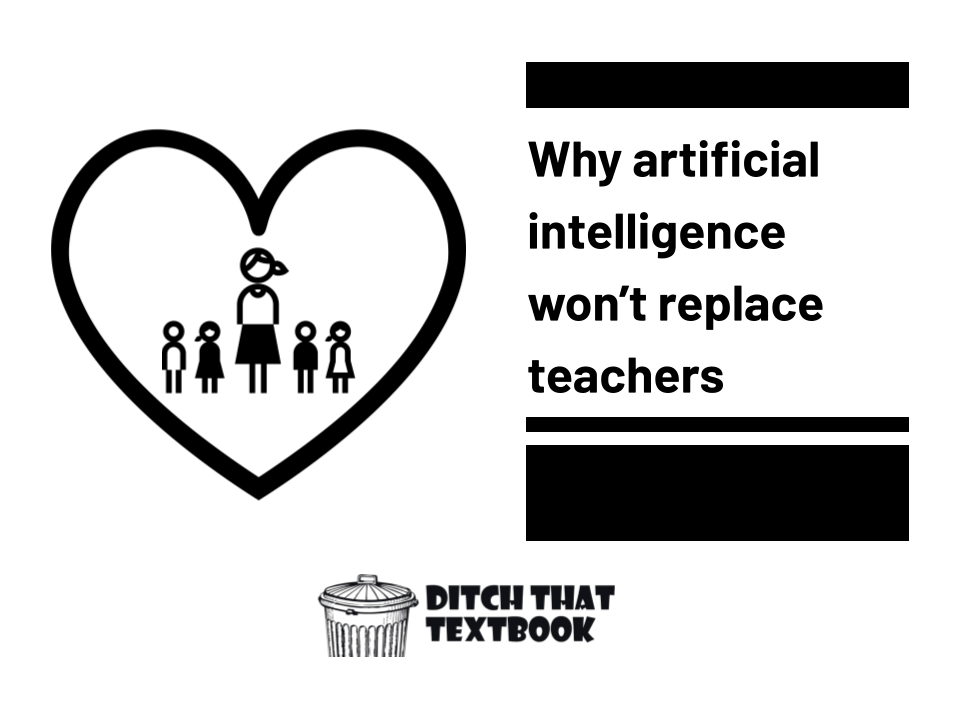
Artificial intelligence continues to grow by leaps and bounds.
For many of us, when we met ChatGPT for the first time, we started asking lots of questions ...
- What can these AI assistants do -- and what CAN'T they do?
- Will students use these to cheat?
- How will this change the workforce -- and what we need to do to prepare students?
And, of course, the big existential question for teachers ...
Will AI make teachers obsolete?
I've been learning about artificial intelligence -- what it is, where it's going, what impact it might have on the world. I mean ... I even wrote a book about a book about AI for educators. (It's called AI for Educators.)
After all of the books and podcasts and blog posts and presentations I've consumed, here's my best answer ...
Nope.
Of course, all of this is up to interpretation (i.e. what does "obsolete" mean ... and in what context?).
But here are my reasons why I think we teachers aren't on a quick path to obsolescence thanks to AI:
1. Education is slow-moving.
The education institution is huge and slow-moving. Think of a barge. These enormous maritime vessels don't do ANYTHING quickly. If you need to turn a barge around, sometimes it has to travel more than a mile just to make the turn.
Education is like a barge. From the top down -- from lawmakers to state officials to school boards to administrators to educators themselves -- change is really slow. We're already starting to see some initial impact of AI on the workforce. But it's going to take a massive overhaul before we're going to see big changes in the policy, curriculum, etc.
We thought COVID-19 pandemic-induced remote teaching would cause us to level up our technology use and practice. But years later, lots of classrooms and schools (and institutions) are still doing business just as they did before.
In this case, inertia is our friend.
2. Parents still want human teachers for their kids.
Let's go back to COVID-19 for a moment. After all of that remote teaching, most parents couldn't wait to send their kids back to school. Remote learning was hard on kids and on families.
(Side note: It cracked me up that some parents called it "home schooling." I was like ... please ... you're not the teacher of record. You're just trying to help your kid with their classwork and to log on to Zoom. This is NOT home schooling.)
After we went back to school face-to-face, teachers were heroes. Parents were so thankful for the skill and patience we used to teach their children.
Of course, nowadays, teachers are in the crosshairs and are under fire about lots of issues. Unfortunately, that praise was pretty short-lived.
However, it did teach us one thing. The face-to-face human connection is something lots of kids ... lots of parents ... lots of families crave.
3. Education isn't an information delivery system.
If education was an information delivery system, we teachers would have been out of a job a long time ago.
We heard it with the internet. YouTube. Wikipedia. Khan Academy. Before that, it was encyclopedias ... and even longer ago, it was books. "If we humans have access to all of the world's information all of the time, we won't need teachers."
And what happened? All of these information resources have just been that -- resources. To be more specific, they've been resources that teachers integrated into teaching to help students learn.
I'm a fan of this quote attributed to William Butler Yeats: "Education is not the filling of a pail but the lighting of a fire." The inspiration. The relationships. The camaraderie. The experience. All of it is part of the education experience.
4. AI technology has a long, long way to go.
You don't have to squint very hard to see a vision of a future where AI plays a role in education -- and, potentially, a big, big role.
AI assistants like ChatGPT can, right now, explain complex concepts to us in real time. They can compose texts -- even prose, song lyrics, dialogue.
Add all of that to the ability to track data on what students demonstrate they know -- and what motivates them -- and what logically is next. The gears are already certainly in motion to create the ultimate AI tutor.
The truth, though, is that AI models still have a long, long way to go. As of the publication of this post, at least, they're still not very good at parsing real-time information from the internet very accurately. They're still fraught with bias, incomplete information, and hallucinations.
They're getting better quickly -- faster than lots of us ever thought they would. But they're still not there.
5. AI can't provide the entire human experience.
AI models don't know what it's like to see the proverbial light bulb go off when a student understands something.
AI isn't able to console a distraught seven-year-old with any level of warmth or compassion.
It can describe the experience of the light bulb moment. And it can offer you advice for consoling that seven-year-old.
People say that AI will become sentient ... that it'll have feelings, emotions, awareness. Really, all it will do is replicate the words that humans use -- the body language that humans use -- the motions that humans use -- when they are sentient themselves.
At some point, we humans see that artificial intelligence is phony. Even if it's good. We all crave that real connection with other human beings. And, as any educator will tell you, that true human experience is still a big part of the education experience.
6. Learning is social.
Let's say, for a moment, that all of human learning could be delivered through an AI tutor. (Again, too much "filling of the pail" and not enough "lighting of the fire".)
Think of all of the important parts of the school experience that would be lacking ...
- Playing on the playground (and the lessons that come from it)
- Telling jokes with friends (and what we learn about human interaction)
- Being a member of a club (and learning the dedication and devotion to it)
- Playing on a sports team (and the teamwork and persistence it takes)
A lot of the school experience -- and the learning experience -- is social. If we want to do it exceptionally, it's going to take incredible, enormous advances in AI, robotics, haptics and VR/AR to even get close to reality.
And at some point, you have to ask ... why? Why would we even do that? What benefit would it have to do those things artificially instead of with the human touch?
Teaching is a work of heart.
I've seen that slogan on t-shirts and magnets and cheap coffee mugs that students give their teachers.
"Teaching is a work of heart." In the past, I've thought it to be a trite and oversimplified way of looking at education.
These days, I think it has a new interpretation.
Think of all of the unique parts of human teaching and learning.
Tying a shoe. Opening a milk carton. Mediating an argument.
Wiping a tear. Giving a high five.
Giving that knowing glance that says, "You got it. You finally got it. I've seen you work and work and work at this. I'm so proud of you."
Teaching really is a work of heart.
Collaboration between humans and AI can help us take teaching to new levels. It can scale some of the work of the teacher so it's more readily available and accessible to students. I could even see big parts of the information-transmitting process fulfilled by AI tutors.
But having AI bots take over the entire education process?
Please.
AI can give us knowledge. It can fill a pail.
I'm not sure it'll ever light a fire the way we humans can.

